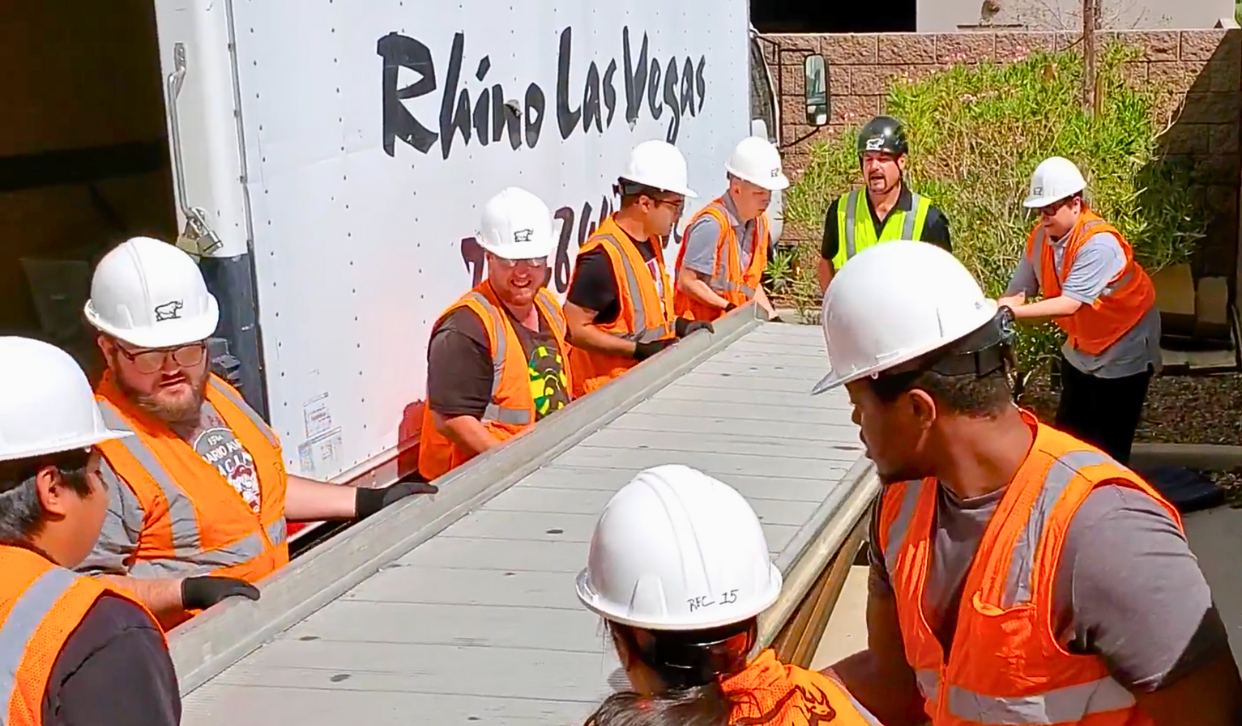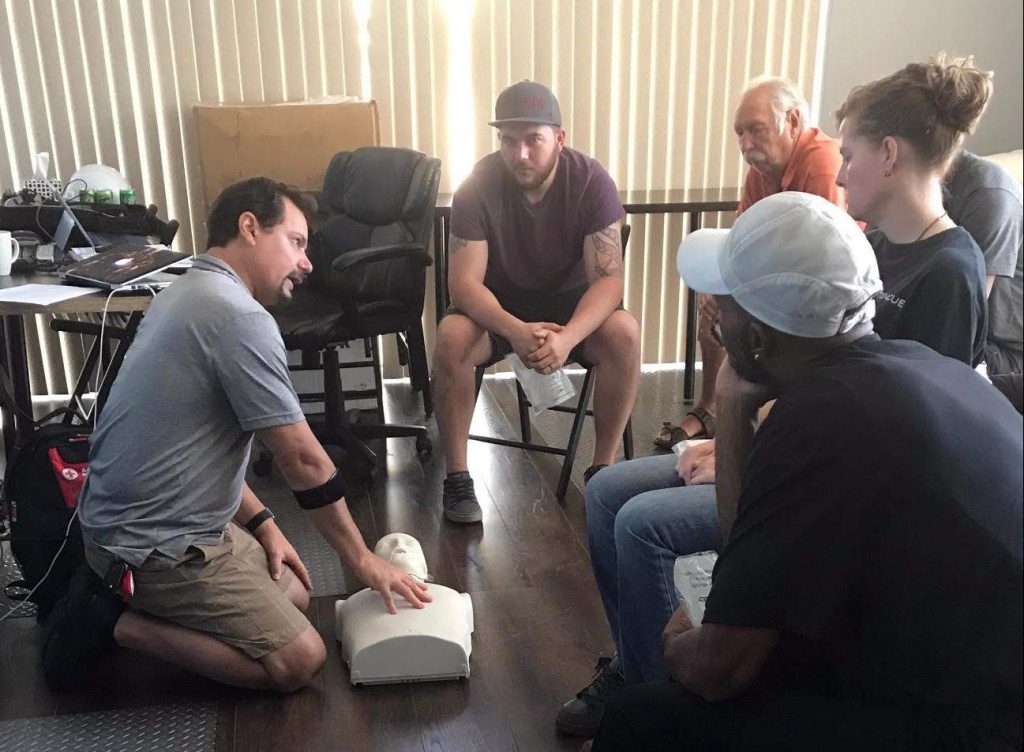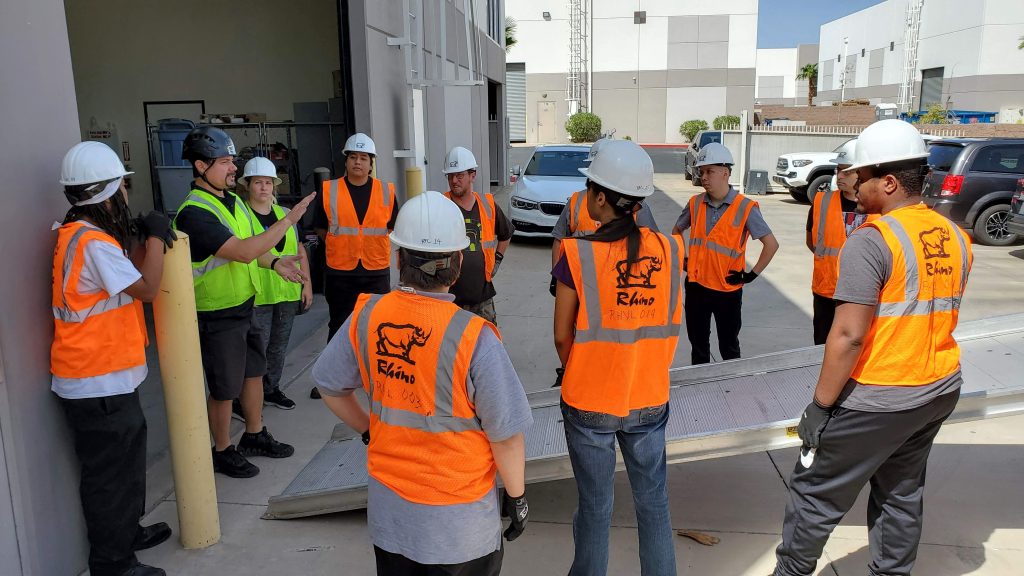

TODAY, INSIDE RHINO features one of Rhino Staging’s most experienced trainers: Rhino Nevada’s Safety and Training Manager, LANCE CANGEY.
How did you get into training?
I’ve had a diverse career background, from being an electrician to owning a retail golf store for 26 years while concurrently working as a stagehand. Throughout my various roles, I developed a knack and enjoyment for training employees. My journey with Rhino Staging started in 2007. It wasn’t long before I was training Rhino stagehands. In 2016, I took on the role of being a trainer for Rhino Nevada. After the challenges posed by the pandemic, I was asked to become the Training and Safety Manager. One of my passions lies in sharing my knowledge and helping employees progress in their careers within the company.
What certifications and qualifications do you have?

I am certified to train stagehands across all the various positions at Rhino, except for rigging. That I entrust to Rhino Nevada’s Johnny Stebbing and Jim Webb. Additionally, I hold certifications as a Red Cross Instructor for First Aid/CPR/AED and as an authorized instructor for OSHA General Industry 10 and 30-hour courses. I’m proud of these qualifications and feel they show my commitment to ensuring my co-workers’ safety and well-being while empowering them with essential skills and knowledge.
What types of training do you do for Rhino Staging?
My role at Rhino involves a wide array of training responsibilities, covering topics from fall protection, catwalk safety, forklift, reach fork, aerial and boom lift operation, and cable coiling techniques. Just since 2023, I have instructed nearly 300 stagehands in OSHA standards. Over my tenure with Rhino, I have certainly trained thousands of stagehands in various aspects of our line of work. My job is to ensure that Rhino stagehands have the necessary skills and knowledge to perform their duties safely and effectively.
Do you travel as a trainer for Rhino Staging?
I actively travel as a trainer and a stagehand for Rhino, which I immensely enjoy. Recently, I flew to San Francisco to conduct OSHA 30 training and visited the Rhino DC office to train stagehands in First Aid/CPR/AED. I find joy in meeting stagehands from various offices, engaging with them, and addressing their questions. It’s interesting to observe different work approaches and dynamics across Rhino’s locations.
What do you enjoy most about being a trainer?
First of all, I love Rhino. The company provides me with valuable opportunities for personal and professional growth. I enjoy being involved in moving our workforce forward. Also, looking at someone’s face when you can tell they get what you’re saying and they are excited about it is hugely satisfying.
What is most challenging about being a trainer?
My experience as a trainer exposes me to a variety of challenges, from the know-it-alls, people falling asleep or not paying attention, to hearing “I’ve been doing it this way for 10 years.” To which, my kind-as-humanly-possible response is, “That doesn’t mean you were doing it right.” But, more to the point, I try to address these recurring challenges by being as prepared and adaptable as possible to whatever the trainees bring to the table.
What mindset do trainees bring to your training sessions?
I feel that the majority of stagehands have a genuine desire to learn and grow. They usually come in excited to learn new skills that they can apply in their roles. When I was new to Rhino I attended every class I could, regardless of my existing knowledge of the subject. My motto is: If I learn one thing new, it is worth it. That underscores the value I place on even the smallest of learning opportunities. With this mindset, I aim to set a positive example for our stagehands and reinforce the culture of continuous learning within Rhino Staging.

What advice would you give someone before they attend training?
It is their time to learn. Know the importance of making the most of your learning time. I encourage participants to ask as many questions as they want. Approach training sessions with an open mind. There is a possibility of discovering something new even if you are familiar with the subject. I feel this will maximize the learning experience and foster a culture of curiosity and growth within Rhino Staging.
What do you hope for your trainees when they complete training?
For starters, I hope they feel empowered by their new knowledge and skills. I hope, too, that they will gain confidence in their abilities to perform tasks safely and effectively. I hope that they appreciate the value of the training and recognize its importance in enhancing their performance and contributing to the overall success of Rhino Staging. Finally, I hope that they are motivated to continue learning and improving.
Is there a lesson you have learned from your trainees?
Look at things from different perspectives and be adaptable. That makes me a better trainer. I recognize that learning is not a one-way street. It’s a continuous and collaborative process where both the trainer and trainees contribute to each other’s growth and development.
Do you see any changes in yourself as a trainer?
My training skills are continuously enhancing. I just saw a video of me teaching “Bloodborne Pathogens” from 2018 and can see a great improvement in my instruction skills and delivery. I cultivate a team and family spirit in our stagehands to foster a positive work culture where they feel valued, which I found for myself in my own experience at Rhino.
What would you say to someone who wanted to become a trainer?
Becoming a trainer requires dedication, continuous learning, and a genuine passion for helping others learn and grow. By sharing your knowledge and expertise, you play a vital role in shaping the future of the company and ensuring its continued success. I love my job and get great satisfaction knowing we empower the next generation of Rhino stagehands.
Any particularly great memory to share from your time with Rhino Staging?
One of my best memories was as a supervisor. A stage carpenter was facing a tough day with the lead who was giving him a difficult time about his work.
Frustrated, the stage carpenter came to me wanting to go home for the day. I sat him down and asked what was happening. After listening to him, I asked him to do me a favor, to forget about what had transpired. I wanted him to go back after the break and show that lead that he was someone that he would want on his call. I asked him to be proactive, reach out to the lead to see what was next, etc.
By the end of the shift, that same lead asked me if he could get that stage carpenter back the next day. Of course, I said that would not be a problem. Today, that stage carpenter is one of our go-to Rhino stagehands.